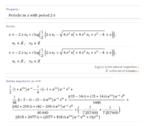andreas_baldur
Newbie level 2

Hello out there.
I'm wondering, if it is possible to make some kind of approximation to the function: f(x)=Cos(Cos(x)).
If I graph it, it gives me a function that looks like one of the form g(x)=A\[\cdot\]Cos(ωt+θ)+φ.
How do I mathematically make the reduction from f(x) to g(x).
Best
Andreas
I'm wondering, if it is possible to make some kind of approximation to the function: f(x)=Cos(Cos(x)).
If I graph it, it gives me a function that looks like one of the form g(x)=A\[\cdot\]Cos(ωt+θ)+φ.
How do I mathematically make the reduction from f(x) to g(x).
Best
Andreas






